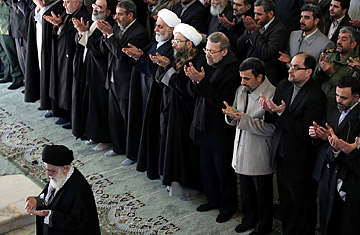
From friends to foes. Ahmadinejad's attempt to promote civilian, Islamist prerogatives at the expense of the clergy's authority ran afoul of Khamenei, the theocracy's Supreme Leader.
(4 of 4)
Still, Iran is in the middle of a vicious economic crisis that neither Ahmadinejad nor Khamenei has been able to address. The value of the currency, the rial, has dropped by nearly half against the dollar in the past month, the price of meat has tripled to nearly $30 per kilo, and the price of tea has doubled. In recent weeks, Iranian companies have defaulted on payments for thousands of tons of rice and grain. The Iranian government, in desperation, is now proposing barter arrangements with some companies, particularly in India, where oil and gold would be traded for food products to bypass sanctions. Things will only get worse. The European Union's embargo on Iranian oil is scheduled to begin in July. In a feeble attempt at tit for tat, Tehran declared that it would cease selling oil to Britain and France. Those two countries, however, buy only a minimal amount of Iranian oil.
The latest round of sanctions has not spared the Revolutionary Guards, which own businesses ranging from car manufacturing to electronics and zinc mines. In January, Hossein Alai, a senior former commander who headed the Guards navy, wrote an unprecedented article in the Etelaat newspaper that noted the similarities between Iran's current situation and its state in the days before the fall of the Shah. The comparison to Khamenei was not lost on Iranians. "There is a faction within the Revolutionary Guards that is deeply upset about the economic sanctions," says Sazegara, the former Guards commander. "Khamenei understands the danger. The knife has hit the bone this time, and it's a real threat for the Islamic Republic."
Through all the infighting, the regime has maintained a united front against the bellicose threats of Benjamin Netanyahu and the White House's refrain of "all options are on the table." Victory on March 2 will only deepen that resistance to external pressure, if not increase the decibels of Khamenei's hard line. If it provokes an attack, the Supreme Leader may just find a way to profit as the country rallies around him in reflexive patriotism. Says Marwan Muasher, a former Foreign Minister of Jordan: "A strike would resurrect the regime from the dead."
